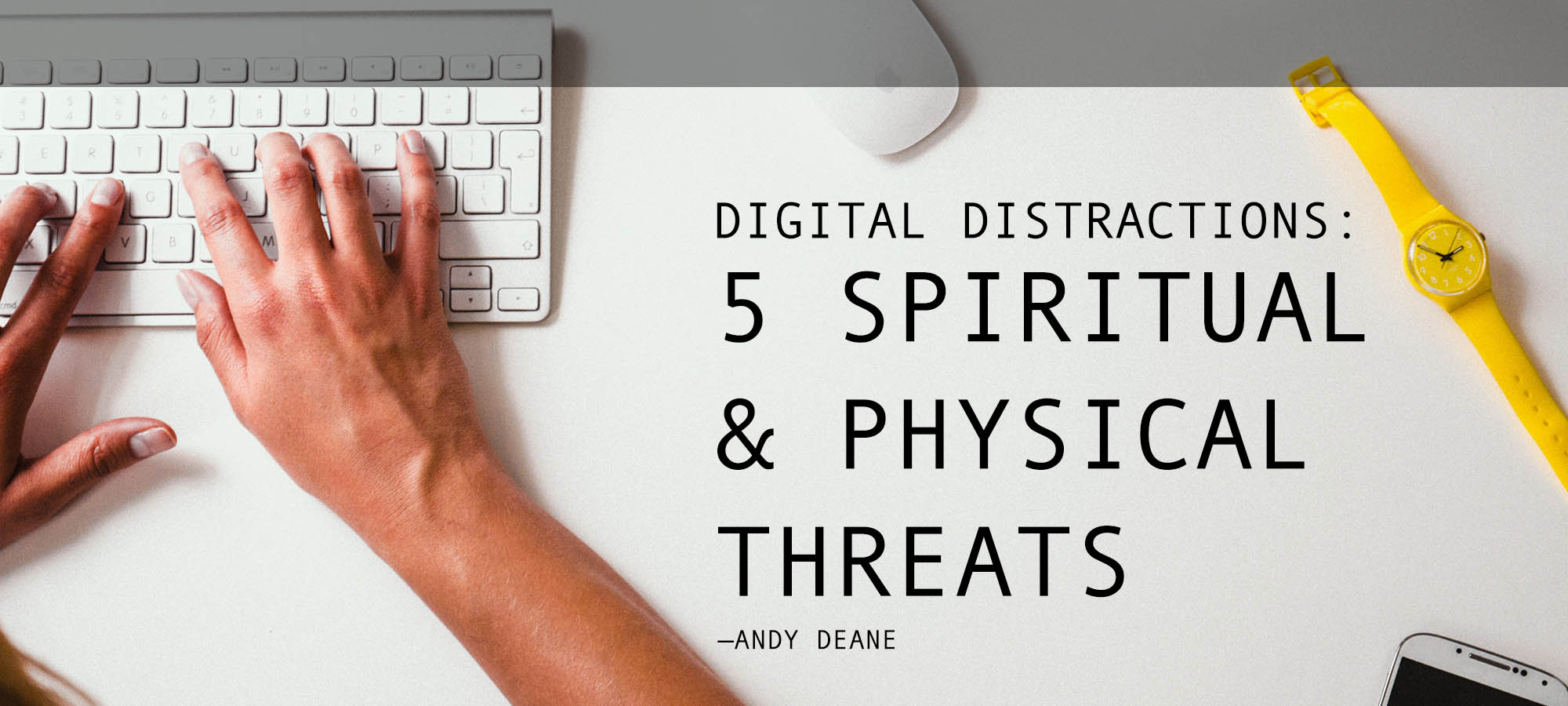
A recent study says, “Fifty-four percent of kids think their parents check their devices too often…32% say they feel unimportant when their parents get distracted by their phones.”¹ I don’t want the conveniences of technology to overshadow the simple importance and value of a conversation with my kids. If I am constantly distracted with technology, what am I communicating to them? Even if I’m doing kingdom work through these screens, do my kids know the difference? And if our screens have the power to damage our worldly relationships, how much more do they damage the spiritual relationship with our Father?
In Luke 10:38-42, Jesus acknowledges distractions as a threat to our intimacy with Him. The passage depicts Martha, concerned with serving and upset over Mary’s decision to rest at Jesus’ feet, but Jesus said, “Martha, you are worried and troubled about many things. But one thing is needed, and Mary has chosen that good part, which will not be taken away from her.” If this is a concern for Jesus, shouldn’t we take the time to determine whether we are concerned with the wrong things too? I’d argue that we are often blinded to the impact of technology. Maybe it’s time to assess our dependency and make adjustments. By allowing technology to weigh so heavily on our list of priorities, we are vulnerable to the following threats:
1. THE THREAT OF ADDICTION:
Addiction may sound like a strong word, but that could very well describe the dependency most of us experience. Can you go a week without looking at social media? Do you feel unsettled when you forget your phone? According to a study published in the Journal of Behavioral Addictions by Dr. James Roberts, behavioral addictions are just as real as substance addiction, sharing a lot of the negative consequences as alcohol and drug abuse. A spike of dopamine is released each time we receive a mobile alert on our phones. Because of this, it becomes harder and harder to stop checking for a new message. We seek more and scroll more, but the chemicals that keep you satisfied can’t keep up with the hits of dopamine that cause you to seek in the first place. This kind of addictive behavior has negative effects on the quality of life. Roberts asserts that cell phone addiction has the unfortunate consequence of “crowding out many more important activities, including family/friends and other pursuits, that might bring us true happiness.”²
Let’s be real here. Even if society is fine with phone addiction, God isn’t. There are several passages that caution us against becoming a slave to anything, like in 2 Peter 2:19, “…For whatever overcomes a person, to that he is enslaved,” and 1 Corinthians 6:12, “All things are lawful for me, but not all things are helpful. All things are lawful for me, but I will not be enslaved by anything.” The problem is not the technology itself; it’s our dependency and constant focus on it.
2. THE THREAT OF ACHES: (PHYSICAL ISSUES)
Aside from psychological dependencies, there are several health drawbacks to persistent use of technology. Look out for headaches from poor posture³ while using phones, carpal tunnel from typing incorrectly and thumb cramps from constant scrolling. Even children are at a far greater risk for developing ADHD4 from playing with apps and games than those who have limited screen time.
Merely spending time in the Scriptures may lessen our aches and pains. The Bible promises that the Word of the Lord will bring health and vitality to our lives. Proverbs 3 states, “…Do not forget my teaching, but keep my commands in your heart, for they will prolong your life many years and bring you prosperity…This will bring health to your body and nourishment to your bones” (Proverbs 3:1-2, 8). Moving away from digital distractions moves us toward strength, satisfaction and peace.
3. THE THREAT OF ATTENTION: (LOSING POWER TO FOCUS)
Have you ever trailed off in a conversation while you attempted to send a text? Your mind is telling you it can’t process information as effectively when it’s doing two or more things at once. When you multitask, you’re subjecting yourself to Cognitive Switching Penalty.5 This is the process of having your mind quickly switch from task to task (or screen to screen), relying on your brain to provide contextual, working memory for each item. Your brain is overloaded, and you are spread thin and exhausted without any deeper, productive work completed. Your energy was spent context-switching. James 1:8 reads, “A double minded man is unstable in all his ways.” Keep focused, and fruit will increase.
4. THE THREAT OF SPIRITUAL APATHY:
Just last week, I watched a video about something I absolutely didn’t care about but felt compelled to watch to the very end. I now know that there is a solution to street flooding through a newly invented porous concrete,6 but my brainpower was spent for two minutes on something that has little consequence to my purposes and priorities. There is an abundance of work to be done for the kingdom. Mindlessly scrolling posts and watching videos dulls our sense of urgency for this work. We are distracted with things we think are interesting, frustrating our capacity to perceive and discern those moments for God’s intents.
Author, Kevin DeYoung, writes: “For too many of us, the hustle and bustle of electronic activity is a sad expression of a deeper spiritual apathy. We feel busy, but not with a hobby or recreation or play. We are busy with busyness. Rather than figure out what to do with our spare minutes and hours, we are content to swim in the shallows and pass our time with passing the time. How many of us, growing too accustomed to the spiritual slothfulness of our age, feel this strange mix of busyness and lifelessness? We are always engaged with our thumbs, but rarely engaged with our thoughts. We keep downloading information, but rarely get down into the depths of our hearts. That’s spiritual apathy—purposelessness disguised as constant commotion.”7
5. THE THREAT OF NOT BEING ALONE:
When you keep tabs on the world at large, your thoughts are trained to continually look outward for context and meaning. The inner life of reflection and imagination is stifled. According to Peter Kreeft, author of Christianity for Modern Pagans, “We want to complexify our lives. We don’t have to, we want to. We want to be busy. For if we had leisure, we would look at ourselves and listen to our hearts and see the great gaping hole in our hearts and be terrified, because that hole is so big, nothing but God can fill it. We think we want peace and silence and rest, but deep down we know that this would be unendurable to us.”8 Busyness sends more people to hell than unbelief because they fail to reflect on the true purpose for our lives!
Because of these threats, I am convinced that all of us should make changes. Think of the spiritual advances we may grasp by simply balancing technology in our lives! We will be stronger, more influential, more discerning people, sensitive to the great call on our lives to be the hands and feet of the Gospel. Jesus, please show us a better way to live. As I’ve researched this topic, I’ve compiled a list of sources for you to browse to learn more about the detriments of digital distraction and addiction. Visit www.ccbc.info/distract for more insights.
¹ “Many Kids Feel ‘Unimportant’ When Parents Are Distracted By Smartphones, Survey Says”– Huffington Post
² Medscape
³ “5 Seriously Bad Side Effects Of Your Smartphone Addiction” – Good Housekeeping
4″Possible Link Between ADHD in Children & Cell Phone Use” – Psych Central
5“The True Cost Of Multi-Tasking” – Psychology Today
6″Incredible Concrete Surface Can Absorb 4,000 Litres Of Water In SECONDS Providing A Flooding Solution” – Mirror.co.uk
7“Don’t Let The Screen Strangle Your Soul (2 Of 2)” – The Gospel Coalition
8“Why Are We So Busy?” – The Gospel Coalition









